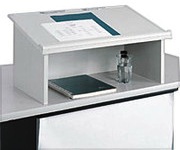My Personal Kobayashi Maru: Why Good Teaching Should Never Rely on Technology

I feel rather undressed without a lectern in a classroom or without a good solid pulpit in a church. (Do not give me a music stand! These contraptions cannot even support the weight of a good-sized Bible.) This affection for the lectern is not merely an idiosyncrasy on my part (I hope). The solid object from which a teacher or preacher speaks serves as the anchor for one’s notes, books, and articles. It provides a center point for engaging the class with the voice and the documents. Without a lectern, one loses this point of focus and gravity. One is reduced to standing directly in front of the class, perhaps holding one’s notes in one’s hand and grabbing a book off to the side once in a while. It is not good.
Why the disappearance of the lectern? Groothuis says it's the increasing dependance on PowerPoint for teaching. Teachers are keying in their notes on their laptops and teaching from presentation software. I've been teaching in one form or another--whether in high school or college classrooms, Bible studies at church or in homes, or occasionally behind a preacher's pulpit--for twenty years now. I'm no Luddite when it comes to technology--I use it quite a bit and am doing so simply to write this blog entry. But I agree with Groothuis that dependance on technology in teaching, or worse technology as a substitute for teaching is a mistake, and I'll tell you why.
Do you remember the Kobayashi Maru in Star Trek II: The Wrath of Khan? To prove that the Wikipedia has some good uses, let me quote from it in regard to the Kobayashi Maru:
In the Star Trek fictional universe, the Kobayashi Maru is a starship that serves as the subject of a graded training exercise at Starfleet Academy, in which command division cadets are presented with a no-win scenario as a test of character.
...
James T. Kirk takes the test three times while at Starfleet Academy. Prior to his third attempt, Kirk surreptitiously reprograms the simulator so that it is possible to win. He justifies it by arguing that putting cadets in a no-win situation was cheating, and so he had to cheat in return. He receives a commendation for original thinking.
Well, I had my own personal Kobayshi Maru when I was just starting out as a teacher. In 1990 I was finishing up my undergraduate degree in English Education. This involved 12 weeks of student teaching at the local public high school. Near the end of this experience, I was to be observed and evaluated by my supervisor at the university. She was not my original supervisor, but one who had been assigned to me near the end of my degree program and we had no real personal relationship with each other. All I knew of her was from her reputation--that she was tough, hard to please and could be unmerciful. She was known for making students repeat their student teaching experience.
Although this was 1990, I was already using a computer extensively in my preparation. I was the first student teacher to prepare all quizzes, tests, and handouts by computer--using MS Works for DOS, no less. Of course, I had to print everything in bold so that the results from a 24 pin dot matrix printer would copy successfully onto the purple ink of the ditto machine. And of course, because I had prepared a test on the computer, I could easily go back and correct mistakes as opposed to the documents that the older teachers used which were full of handwritten corrections and had been for the twenty or thirty years they used them because they didn't want to retype it on their typewriters. I impressed the teacher I was working under at the high school with my overhead transparencies. Overheads produced from typewriters were difficult to see. But using a computer I could actually raise the font to a legible size. This was well before PowerPoint became mainstream.
Near the end of my student teaching experience, my supervisor was scheduled to come and evaluate me. Everything was riding on this, so I had to do well. But i was less than hopeful. This was my kobiyashi maru--my seemingly unwinnable scenario. Why? Because this particular supervisor had a reputation for sabotaging her students simply to observe how they would react. She didn't care how well they could teach a lesson. She didn't care how much learning might actually be going on in a classroom. She just had some kind of sadistic desire to make her students squirm, and if possible, fail.
So, the night before my observation, I went through my entire lesson over and over again. I tried to think of various ways she could trip me up, and then I discovered the weakness in my own prepared lesson--a lesson, by the way, that I had to give to her in advance with a list of everything I would use to teach it. I had to ask myself what could happen that would possibly prevent me from being able to teach my lesson in the event of a worst case scenario. In asking that, I had my answer.
So as I began to teach my lesson the next morning, I went to turn on the overhead projector as I always did every class. But this time, the bulb didn't work. No light, and to make matters worse, my whole lesson revolved around that projector. I knew I had just changed that bulb the week before. Further, there's always an extra bulb inside the projector. But when I looked inside, it was missing. My she-demon supervisor thought she had me. I didn't dare make eye contact with her. I didn't want to see what I assumed to be a smirk across her lips or the glow of her devil horns.
Instead, very cooly, I reached down to the lower shelf of the projector stand and pulled out a stack of papers. I said to the class, "Well, I didn't want to give you this until the end of class, but since the projector isn't working, you may look on the handout I've made for you that has the exact same information as my overhead.

I learned a valuable lesson that day: never depend on technology for my lesson.
And I've learned to ask this most important question: Can I still teach my lesson if my technology fails?
It's not to say that I don't use technology in the classroom. I use technology to type my lessons, but I always print them out to have them with me, and I simply prefer to teach from paper than from a computer screen. Yes, I will use PowerPoint (technically I now use Keynote), but I never let presentation software drive my lesson. It is a tool to aid my discussion; it is not the basis for the discussion itself.
Over the years I have experimented with placing my lessons on a PalmPilot or teaching from the notes view in PowerPoint, but I've never stuck with these methods beyond trying them for curiosity's sake because they don't meet the qualification of my question in bold above. The visuals that presentation software allows me to use are fantastic, and I take advantage of it. However, I never let it become the focus of what I'm doing. I can teach with my notes and the ability to engage my students in discussion and create a better learning atmosphere than a PowerPoint-based lesson any day.
Since the dawn of the computer in the classroom, I've seen professors waste valuable class time because they couldn't get their laptops to "talk" with the projector. I've known of professors to cancel class altogether simply because a projector bulb was out. It's absolutely shameful to the profession to waste the students' time like that. But if everything is dependent upon the technology, what else can they do?
I've walked out of the house with my PowerBook on my shoulder only to have the strap break and have the computer come crashing to the ground. I had the same iBook in for repairs twice because of that in 2001. If I had all my notes exclusively on that computer, I would have been in a real mess. Laptops can break, Palm screens can crack, and projector bulbs can go out. But can I still teach if my technology fails?
The problem with computers is they offer to do everything for us. Yet, when they decide not to work, it leaves us without the ability to go back and do things the way we used to.
I don't necessarily have to have a full podium like Groothuis. A tabletop lectern is fine, and I even simply use a music stand when I teach Sunday School these days. In the regular classroom, I have my PowerBook handy, but it's down on the table--it's not the center of what I'm doing.
And if the technology fails, this teacher can still teach just fine.









